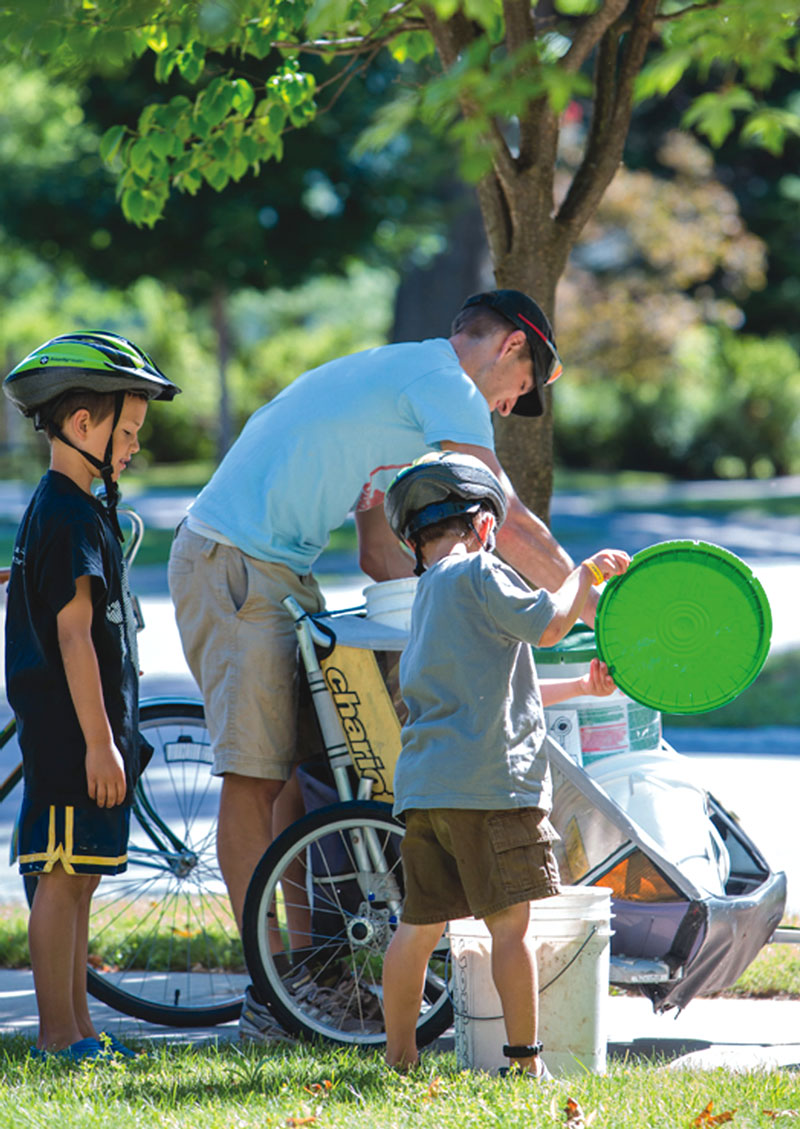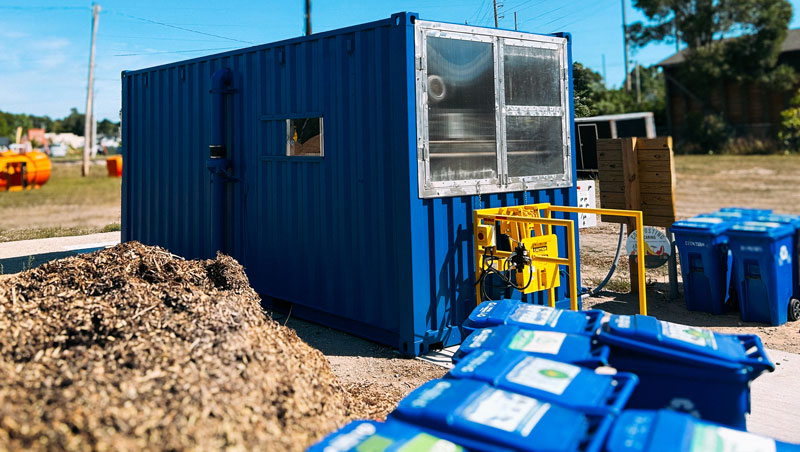Top: Megan Alexander, owner of Carter’s Compost. Photos courtesy Carter’s Compost

Ty Schmidt (middle), with sons Carter (left) and Jameson (right), as they were featured in BioCycle’s 2014 article. Photo by Beth Price
In 2014, BioCycle published an article on small-scale food scrap collection entrepreneurs. One of the businesses featured was Carter’s Compost in Traverse City, Michigan, which was started by Carter Schmidt in 2012 at age 7, along with his father, Ty Schmidt. “My dad was blogging on the computer, and he came across Bootstrap Compost in Boston, Massachusetts, a food scraps pick-up service,” explained Carter. “He thought, ‘Wow that is really cool.’ We have a trailer, we have bikes, we have buckets…and he sent me on my way.” Carter’s Compost charged $10/month to collect the food scraps, which he and his father (along with a few others) composted in various backyards, including their own. They took a break in the winter, when it was too cold to do bike-powered collection and home composting.
In 2021, Megan Alexander, a Traverse City native, was living about two hours away and saw that Carter’s Compost was posting online that the business was seeking someone to take over. Carter was 18 years old, and was graduating from high school in May 2022. “My family and I moved back to Traverse City in the winter of 2021,” says Alexander. “The Schmidt’s were still looking for a buyer. Our families know each other so I got in touch and within three seconds, I knew I was going to take over the business — which happened in spring 2022. My background is in supply chain management and logistics, with an emphasis on sustainability, which lends itself well to this type of service. I had always wanted to own my own business, and this seemed like the perfect opportunity.”
Alexander had subscribed to a food scraps collection service where she lived previously so had some familiarity with the process. The Schmidt’s had about 50 residential customers, and operated from May through October. “I didn’t change anything the first year, as I have a full-time job and needed to start out slowly,” she explains. “Between my nephew, cousin, father and myself, we were able to service the routes.”
Currently, Carter’s Compost has about 100 households and commercial accounts that include restaurants, apartments and condominiums. Only vegetative food scraps, grains, bread, pasta, tea bags and coffee filters are accepted from households; commercial accounts can include all food scraps and BPI-certified compostable food-contact items. Households receive 5-gallon buckets; commercial accounts use 32-gallon carts. To build efficiency into collection, Alexander created neighborhood hubs where multiple households subscribe to use a centrally located drop-off site at one of the hub member’s homes. Carter’s Compost has four hubs that service five to ten households each. Two seasonal drop-off sites are also available, one at the Traverse City Farmers Market and another at Lightwell Lavender, one of the farms hosting a composting site for Carter’s Compost.
Food scraps are composted at a children’s garden and several farm-based sites on a seasonal basis, and most recently at a new composting site owned by the City of Traverse City that opened in September 2024. The city received a $255,396 grant from the U.S. Department of Agriculture’s Composting and Food Waste Reduction Program to purchase a 20-cubic yard in-vessel Earth Flow unit from Green Mountain Technologies. The unit is equipped with a cart tipper. SEEDS Ecology & Education Centers oversees the unit as well as the finished product distribution, and Carter’s Compost was selected as the hauling contractor to offer residents the opportunity to participate in food waste pickup. The finished compost is expected to be used by the city for public lands, parks, and green spaces, with any surplus provided to community gardens. “The Earth Flow unit operates year-round and has about 150 tons/year of capacity, which has enabled us to start offering year-round collection,” notes Alexander. “From May through October, we will continue to use bikes and trailers for residential collection, and from November to April, we’ll be using a vehicle. Overall, we have access to more than 175 tons/year of composting capacity between the city site and the farms we use.”

Traverse City’s Earth Flow in-vessel composting unit, from Green Mountain Technologies, is equipped with a cart tipper. It has capacity to compost 150 tons/year of food scraps and amendment. Photo courtesy City of Traverse City
The quantity of food scraps collected has increased gradually since Alexander became owner of Carter’s Compost. In 2022, about 6,000 lbs of food scraps were collected over six months; in 2023, that increased to about 14,000 lbs over six months. In 2024, she expects to collect “somewhere north of 25,000 lbs.”
The post Passing The Food Scraps Collection Torch appeared first on BioCycle.

